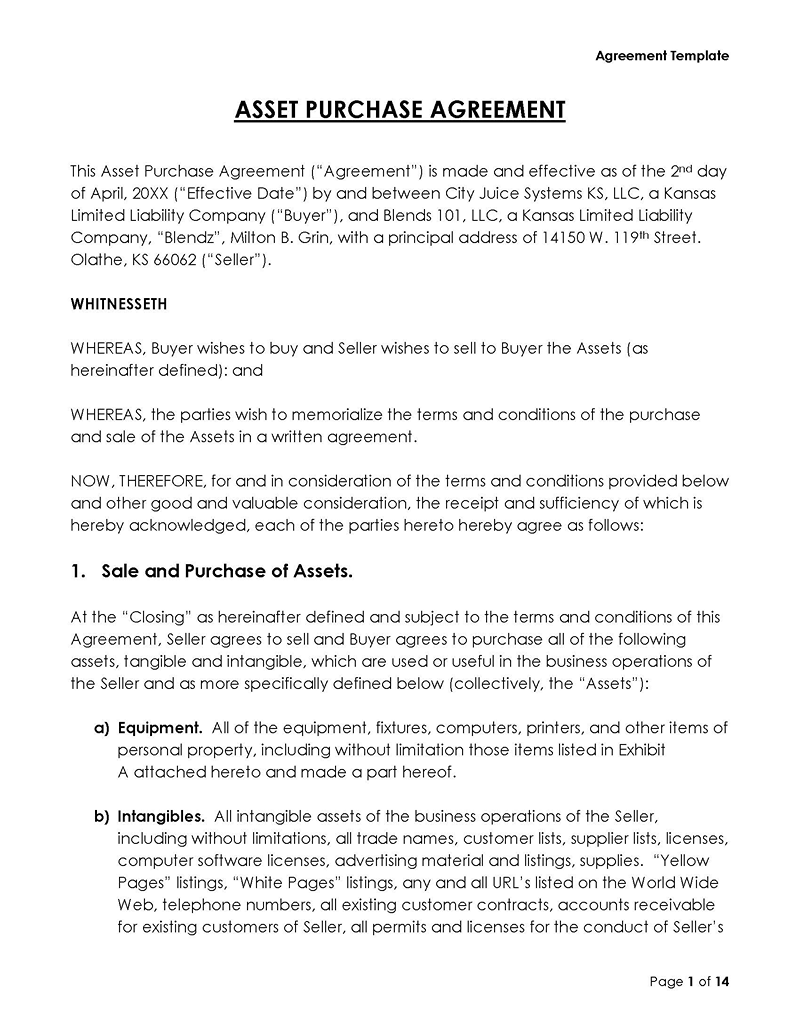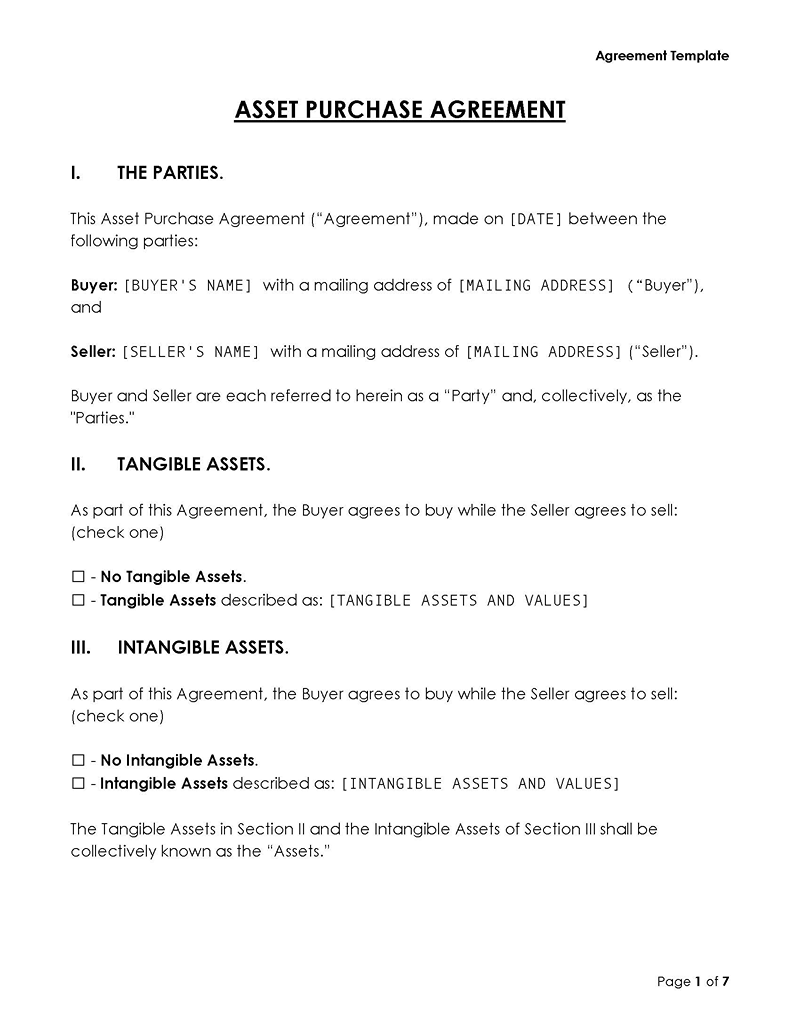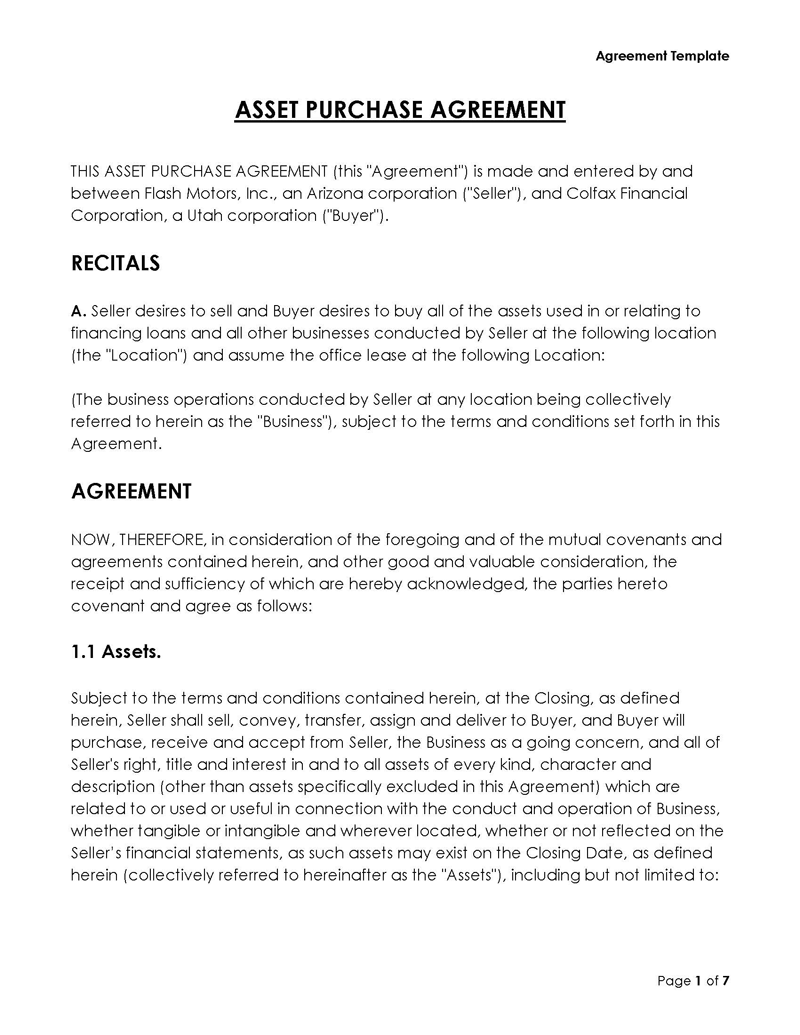An organization, either big or small, has its assets and liabilities. But, of course, almost no businessperson wants to buy the liabilities of another company. So instead, they are primarily interested in the assets. Any business must understand how contracts work, especially regarding assets. This knowledge will aid in the getting the best values when you decide to sell or buy assets like equipment or trademark. Therefore, an asset purchase agreement template becomes essential. It is a guide to getting most of the written details of the contract. Having the appropriate template goes a long way to ensure both parties are satisfied.
This article explains the terms and everything else you need to understand about the asset purchase agreement.
Asset Purchase Agreement
The asset purchase agreement is called “APA” or business purchase agreement. It is an agreement that clearly states the terms and conditions regarding the sales of a company’s assets.
APA is a legal document that facilitates selling a company’s part to another party, either tangible or intangible. The company signs over its legal right after both parties are satisfied with the terms and conditions.
The asset purchase contract is different from a merger-acquisition transaction. The seller has the right to decide which asset to sell and which to exclude in an asset purchase. However, all the assets have to be given away in a merger-acquisition transfer.
Many individuals often mistake asset purchases for share purchases. Buying shares involves acquiring liabilities and assets. The company initiates the sale of its asset. On the other hand, shareholders are responsible for the sales of shares.
After selling the assets, the seller has a legal obligation to either pay capital gains or ordinary income tax depending on the nature of the assets.
Businesses prefer to sell shares instead of assets. Intending buyers, however, often prefer investing their money in assets. In addition, purchasing assets allows the buyer to avoid any liability involved in the organization.
The more information included in asset purchase agreements, like any other agreement, the better. In addition, it is vital to avoid general terms in an agreement. General terms may serve as grey areas that may be exploited to the disadvantage of a party. Therefore, it is critical that the wording of an agreement is clear, precise, and without any room for ambiguity.
An asset purchase agreement is essential for several reasons. First, it must give a detailed description of the asset. Specificity and exclusivity are important when a business has no intention of selling all its assets.
Free Templates



Assets Transferred in APA
APA is a legal document that covers the transfer of assets and not liabilities of a company. Therefore, it is of the utmost importance that it states the description of the asset. An asset purchase agreement covers the tangible and intangible assets of a company.
They include:
- Equipment
- Contract
- Customer list
- Premises
- Trademark
- Stock
- Patents
- Know-how
Advantages and Disadvantages of APA
There are benefits, likewise problems associated with using APA during asset purchase. Therefore, it is crucial to understand the advantages and disadvantages of an asset purchase agreement. This knowledge helps parties involved make informed decisions.
Advantages
There are several benefits to using them. Let us explore these benefits:
- Fair market value: The main advantage is that it optimizes fair market value. This is because the party purchasing assets can distribute the cost price among assets to indicate their market price. Therefore, it gives room for increased depreciation and amortization deductions. As a result, they save money on future taxes.
- Cherry-picking: Another advantage of APA is cherry-picking. The party trying to make a purchase can cherry-pick assets while leaving out liabilities. In addition, it involves a reduced risk of hidden liabilities compared to buying company stock.
Disadvantages
Here are some things to watch out for:
- Rules of transfer: The rules of transfer are the primary disadvantage. When buying an asset, it must be transferred according to the appropriate rules. Moreover, the rule of transfer is enforceable against third parties. For example; we have customer contracts or consents. A third party may use the transfer as a chance to renegotiate their deal. As a result, the transfer may be delayed or the cost may increase. Additionally, in some cases, contracts are non-transferable. Also, some licenses and consents may be unique and, hence, non-transferable. In other cases, the buyer may choose to maintain customer relations. Therefore, they decided to buy company shares instead of assets.
- The problem with liabilities: Buying assets means the purchase does not include liabilities. However, in some cases, the organization has liabilities and debts. Therefore, the purchase cost must be a fair price so that the organization can generate enough capital to cover its liabilities. The transaction may be considered fraudulent if it does not aid the company in providing adequate capital.
Affairs to Consider in the Asset Purchase Agreement
The asset purchase agreement is not only about assets. Other factors must be considered as well. It is essential to understand all these to get through the deal successfully.
Stock
Stock is one of the affairs that must be considered. Therefore, it is crucial to estimate the value of the stock. As a result, there can be a mechanism to evaluate its worth. Additionally, a stock check is essential to determine its actual value. This can play a significant role in changing the selling value.
VAT
Value-Added Tax may not be an issue for businesses with enough resources to meet their financial obligations. However, both parties involved in APA have to be VAT registered. Therefore, the APA will have a segment to cover issues regarding VAT.
Goodwill
When a brand’s goods or services are excellent, it prompts customers to come back for more. On the other hand, suppose customers are unsatisfied with the brand’s goods or services. This can affect the brand’s reputation (or goodwill). Therefore, goodwill describes the positive reputation associated with a brand.
A party looking to purchase a company’s asset will need assurance that they will not be affected if the goodwill is affected. As a result, buyers may insist on including restrictive covenants like a non-compete clause in the APA.
Employees and TUPE
TUPE-Transfer of Undertakings (Protection of Employment) aims to protect employees’ right to transfer business assets. TUPE functions on the premise that the employees will be automatically transferred when a party buys business assets as a “going concern” (the business has enough resources to meet its financial obligations).
Therefore, the affected employees need to be informed regarding the new changes to the organizational structure. Additionally, it is best to seek the expert advice of a lawyer on employees and TUPE.
Contracts
Suppose a contract is highly relevant to the business. For example, the party making an asset purchase may insist on a new contract before finalizing the transfer. As a result, the seller may require a novation agreement to cater to all three parties.
Asset Purchase Vs. Stock Purchase
An asset purchase agreement entails the acquisition of the assets (without the liabilities) of an organization. On the other hand, a stock purchase agreement involves the acquisition of a company’s assets and liabilities.
Let us explore the differences between them:
| Asset purchase | Stock purchase | |
| Tax treatment | Capital assets are taxed as capital gains. Other assets are taxed as regular income. | The stock purchase is taxed to the seller as a capital gain |
| Business liabilities | The buyer does not acquire business liabilities when they purchase the asset. | Business liabilities are transferred to the buyer in-stock purchase |
| Tax basis | The market value of an asset is adjusted to a fair price. | The market value of the asset is not adjusted to a fair price. |
| Real-world difference | It covers acquiring part of a business’s assets. | A stock purchase agreement involves acquiring both the assets and liabilities of a company. |
How to Write Asset Purchase Agreement
Writing an asset purchase agreement is not as simple as it sounds. Certain terms and information must be included.
Here are the components that must be included:
Date
It must contain the date (day, month, and year) when the deal was first consented to by the parties involved.
The parties
The entity in control of the asset relinquished in the agreement is the “seller.” The entity to acquire the asset after purchase is the “buyer.” The seller and buyer are described individually as “parties” and collectively as “parties” in the agreement.
Tangible assets
Suppose the agreement is regarding tangible assets. The buyer agrees to purchase, while the seller agrees to sell them. Tangible assets are those that are physical and can be seen and touched. Therefore, the checkbox for tangible assets should be checked.
Intangible assets
Suppose the agreement is regarding intangible assets. The buyer agrees to purchase them, while the seller agrees to sell them. Therefore, the checkbox for intangible assets should be checked.
Purchase price (how much is it for)
The agreement should state the agreed amount for the asset in words and figures. For example, it can be written in the APA as “The purchase price for the asset is $(exact amount).”
Deposit
A deposit is an initial payment that may be required to validate the deal.
Here are the terms associated with it:
- Required deposit: Suppose the seller requires the buyer to deposit to validate the agreement. The checkbox “required deposit” should be selected. It is essential to state theexactt amount) and the payment date.
- Not Required: Suppose the seller does not require the buyer todeposit moneyt to validate the agreement. Then, the checkbox “not required” should be selected.
- Refundable: Suppose the deposit is refundable after a period. The checkbox “refundable” should be selected.
- Non-refundable: When a buyer requires a deposit, it is necessary to determine its refundability state. Suppose it is not refundable. Mark the box “non-refundable.”
Payment
The payment can be made in either of two ways. First, the payment can be made at closing. Secondly, the payment can be made through owner financing provided by the seller, according to the structure below:
- Down payment (at closing)
- Interest (%)
- Duration: (specify) month (specify) year
- Due date of payment: every (specify day or date) of the month
Financing
The parties can choose any of the three options available for the financing agreement:
- Not contingent on the buyer acquiring financing. The party purchasing must present proof of funds within (specify date) from the signing of this agreement.
- Contingent on the buyer’s ability to get financing from a third party. The party purchasing must bring forth evidence, such as a pre-approval letter from a credible financial source within (specify date) of signing the agreement.
- Contingent on the buyer’s ability to get finances from the seller. In this case, the buyer has (specify date) to get approval from the seller.
Requirements and warranties
Before assets can be sold, there is a need to confirm the need for the approval of a third party.
- No requirement: for approval by any third party
- Requirement: approval by a third party is required before assets can be sold (describe the third party in detail)
On the other hand, a warranty is a form of protection that usually favors the buyer. For example, suppose the seller cannot guarantee the quality of the asset. The buyer needs protection from extreme consequences, like termination of the agreement.
Closing date and time
In this segment, the closing date and time must be specified. The parties must duly agree upon any extension.
It must contain:
- The exact date the seller receives the requirement for the sale of the asset
- The hour the closing occurred (specify AM or PM)
Closing costs
The parties must determine who will bear the responsibility of the closing cost:
- Buyer
- Seller
- Both parties
Transfer of assets
The seller must consider the following:
- Title: A bill of sale shall be included at the closing. It shall serve as evidence of the transfer of ownership of assets mentioned in the agreement. In addition, the seller shall place all titles and certificates related to the assets in the name that the buyer specifies.
- Period of closing: Until the purchase is closed, the seller is responsible for any loss or damage to the assets in question. Suppose the assets are lost or damaged before the closing. Then, the seller can renegotiate a selling price reduction to match the valuation decline. However, the parties have a specific period to renegotiate. Otherwise, the agreement becomes void, especially when the buyer made no initial deposit.
Governing laws
The governing laws will guide the letter of intent for the agreement.
Seller and buyer’s signature with date
Finally, the parties involved in selling and buying shall provide their signature, name, and date.
Signing requirements
After finalizing the signings, the buyer needs to do the following:
- Payment of VAT
- Payment of stamp duty and stamp duty land tax (transaction regarding interest generated in land in the UK)
- Novation of contracts with suppliers and customers
- Administrative fees, including insurance, VAT, payroll, pension, and PAYE
Capital Gains
Suppose an asset is sold for a price higher than its value. The profit made from it is called capital gains.
There are two types of capital gains, according to the IRS:
- Short-term: These are profits realized when assets are owned for about a year or less. Short-term capital gains are taxed as ordinary income (about 10% to 37%)
- Long-term: Long-term capital gains are from assets owned for more than a year.
The tax depends on the income of the seller:
- 0% for income lower than $78,750
- 15% for incomes between $78,750 to $434,550
- 20% for incomes exceeding $434,550
What is a Capital Asset?
The classification of a capital asset according to the IRS includes:
- Real estate (investment or residential)
- Bonds and stocks
- Vehicle
- Jewelry
- Household furnishings
- Precious metals (diamond, gold, etc.)
- Personal property
What is Not?
Here are the things that do not qualify as capital assets:
- Real estate (used for business)
- Accounts from a barter agreement
- Intangible properties like inventions, copyrights, designs, trademarks, or models
Conclusion
An asset purchase agreement covers the transfer of ownership of certain assets. The party selling can determine what part of the asset is to be sold. They may need to pay capital gains or ordinary income tax.
An asset purchase agreement can protect the rights and enforce the responsibilities of the parties involved. It is essential for several reasons. First, it describes the asset that a party is willing to purchase. Additionally, the agreement states the terms for the transfer of ownership.




